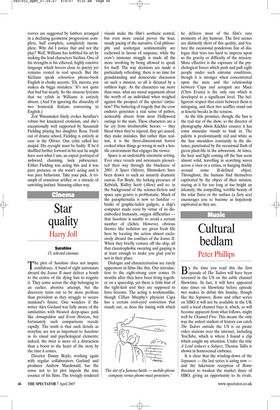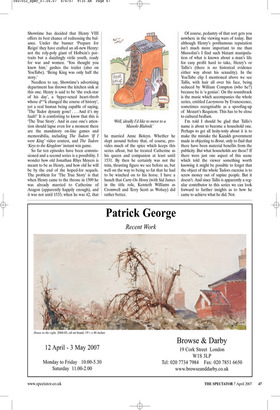Cultural bedlam
Peter Phillips
By the time you read this the first episode of The Tudors will have been screened in the US on the cable channel Showtime. In fact, it will have appeared nine times on Showtime before episode two makes its debut this Sunday, though like the Sopranos, Rome and other series on HBO it will not be available in the UK until a local channel buys it, which, as will become apparent from what follows, might well be Channel Five. This means the only way the ardent student of history can catch The Tudors outside the US is on pirate video stations over the internet, including YouTube, which is where I found a clip which caught my attention. Under the title A Lord seduces a Subject, Thomas Tallis is shown in homosexual embrace.
It is clear that the winding-down of the Sopranos — the last series is airing now and the lukewarm reception of Rome threaten to weaken the market share of HBO, giving an opportunity to its rivals. Showtime has decided that Henry VIII offers its best chance of redressing the balance. Under the banner ‘Prepare for Reign’ they have crafted an all-new Henry: not the roly-poly giant of Holbein’s portraits but a dazzlingly virile youth, ready for war and women. ‘You thought you knew him,’ gushes the trailer (also on YouTube). ‘Being King was only half the story.’ Needless to say, Showtime’s advertising department has thrown the kitchen sink at this one. Henry is said to be ‘the rock-star of his day’, a ‘hyper-sexed heart-throb whose d**k changed the course of history’, yet a real human being capable of saying, ‘The Tudor dynasty gone! ... And it’s my fault!’ It is comforting to know that this is ‘The True Story’. And in case one’s attention should lapse even for a moment there are the mandatory on-line games and memorabilia, including The Tudors ‘If I were King’ video contest, and The Tudors ‘Keys to the Kingdom’ instant win game.
So far ten episodes have been commissioned and a second series is a possibility. I wonder how old Jonathan Rhys Meyers is meant to be as Henry, and how old he will be by the end of the hoped-for sequels. The problem for ‘The True Story’ is that when Henry came to the throne in 1509 he was already married to Catherine of Aragon (apparently happily enough), and it was not until 1533, when he was 42, that he married Anne Boleyn. Whether he slept around before that, of course, provides much of the spice which keeps this series afloat, but he treated Catherine as his queen and companion at least until 1531. By then he certainly was not the trim, thrusting figure we see before us, but well on the way to being so fat that he had to be winched on to his horse. I have a hunch that Carry On Henry (with Sid James in the title role, Kenneth Williams as Cromwell and Terry Scott as Wolsey) did rather better. Of course, pedantry of that sort gets you nowhere in the viewing wars of today. But although Henry’s posthumous reputation isn’t much more important to me than Mussolini’s I find such blatant manipulation of what is known about a man’s life for easy profit hard to take, Henry’s or Tallis’s (there is no historical evidence either way about his sexuality). In the YouTube clip I mentioned above we see Tallis, with hair all over his face, being seduced by William Compton (who he?) because he is ‘a genius’. On the soundtrack is the music which accompanies the whole series, entitled Lacrymosa by Evanescence, sometimes recognisable as a spoofing-up of Mozart’s Requiem. This has to be close to cultural bedlam.
I’m told I should be glad that Tallis’s name is about to become a household one. Perhaps to get all hoity-toity about it is to make the mistake the Kazakh government made in objecting to Borat, only to find that there have been material benefits from the publicity. But what households are these? If there were just one aspect of this scene which told the viewer something worth knowing it might be possible to forget that the object of the whole Tudors exercise is to screw money out of supine people. But it doesn’t. And since Tallis is apparently a regular contributor to this series we can look forward to further insights as to how he came to achieve what he did. Not.



































































 Previous page
Previous page